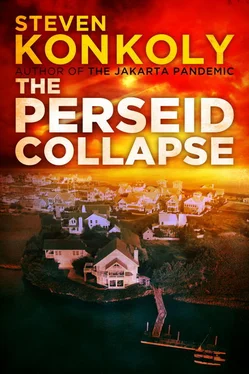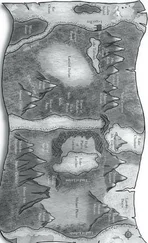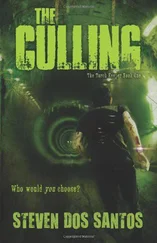“Expecting trouble?” she asked.
“Something isn’t right. That’s more cars than I’ve seen since this whole thing started.”
Littner opened the trunk and dug into a long nylon bag, producing a stripped-down AR-15 for Karen. He pulled back the charging handle and locked the bolt carrier back, handing her the cleared weapon.
“Old school iron sights,” she said, examining the bore.
“I don’t put any fancy gizmos on my rifles. Let me know if that’s going to be a problem.”
“As long as it shoots straight, we’re in business,” said Karen.
“It shoots straight. Front sight is set for one hundred yards,” he said, handing her three magazines.
Less than a minute later, they were back on Milton Mills Road, heading toward the border. The northern crossing appeared beyond a small, blue-trimmed Cape Cod home, flanked on both sides by wide expanses of calm water. The road extending to the New Hampshire side was clear, except for a small group of young adults loaded down with backpacks and camping gear, pedaling mountain bikes over the bridge.
“Seems kind of odd that the state police would forget this spot,” said Karen.
“York County Sheriff’s Department and the state police alternate duty days out here. It’s possible, but unlikely,” said Littner.
He drove past French Street, which connected the two bridge crossings on the Maine side, and rolled his window down to address the closest cyclist. The group slowed, eyeing each other.
“Did you see any police on the other side?” he asked.
“Something happened at the other bridge, but I didn’t see any police,” said one of the men toward the front.
“They kind of looked military to me,” said the woman next to him.
“Who looked military?” asked Littner.
“The dead guys on the bridge.”
“They weren’t military,” said one of the guys at the back of the group. “Hair was all fucked up, and none of them wore the same gear. They all had those stupid boonie hats on too. Every unit we’ve seen coming up through New Hampshire is geared up for heavy combat. Helmets, body armor—everything.”
Heavy combat? Littner didn’t like the sound of that.
“How many are on the bridge?” he asked.
“I saw maybe six or seven of them. Three on the New Hampshire side. More in the middle. Not sure what was on this side. We didn’t stick around very long,” said the woman.
“Thanks, everyone. I don’t want to hold you up any further. Looks like you have a little break in the weather. You guys headed anywhere in particular?”
“Probably try to make it to the Bridgton area. My family used to rent a house on Long Lake every other summer. There’s a private school up there. Should be empty.”
“Bridgton Academy. It’s in North Bridgton, about five miles past town. When you get to the intersection in Bridgton, across from the Food City, keep going straight. You’ll see the signs. Good luck,” said Littner.
“You too,” said the cyclist, fixing his eyes on Littner’s hat.
The cyclists had cleared the intersection by the time he turned around and took a right onto French Street, speeding toward the southern bridge. The first thing he saw beyond the white Baptist church was a blue Volvo SUV parked in the middle of French Street near the bridge. The driver’s-side doors had been left open.
The scene unfolded slowly as their car crept past the SUV. Several members of Eli’s Maine Liberty Militia, easily recognizable by their boonie caps, lay in a grotesque pile at the foot of the bridge. Two more men lay dead toward the middle of the bridge against the left guardrail. He didn’t see any weapons on the ground, which didn’t surprise him. Whoever had done this would have stripped Eli’s men of anything useful. He parked the car next to the mound of bodies.
“Shit,” he said, “I guess we better take a closer look.”
“I don’t see the point. Someone shot up Eli’s people. Probably the bikers we saw,” said Goodsby.
“Just a quick look and we’re out of here.”
He pulled the first body halfway out of the pile, disturbing hundreds of flies that had gathered. He turned the corpse on its back.
“Wounds look fresh. I’ve seen my share of traffic accidents to know that,” she said.
Karen Goodsby had worked as a part-time Emergency Medical Technician (EMT) out of Gorham before taking a full-time position at Waterboro Elementary School a few years ago. He didn’t know much more than that, but Harrison Campbell constantly sang her praises.
“Two to the chest, one to the head. Mozambique Drill. Looks like the work of a professional,” said Littner.
“There’s a lot of blood on the Land Cruiser’s windows. Maybe an ambush?” Goodsby surmised, pointing at the bullet-riddled SUV backed into the bushes across the road.
“Could be. I’m counting five guys here. Three with headshots. Looks like two more dead on the bridge. A ton of brass on the ground. Whatever happened here was quick and vicious. Probably a coordinated strike against both sides. This is part of something bigger,” he said, raising his head to scan the other side of the bridge.
“Think we’ll find more on the other side?”
“I don’t plan on staying around long enough to find out. I’m going to pull a few more off the pile and take pictures for Harrison.”
He gripped another body from the bloody mound and pulled it free of the mess.
“Holy shit,” hissed Littner, the body’s torso and head thunking against the pavement.
Goodsby raised her rifle and crouched, scanning the open sectors around them.
“What is it?” she whispered.
“We have a big problem,” he said, nodding at the body.
She glanced down at the man’s face and shrugged her shoulders.
“That’s Eli’s little brother,” he said, staring at the red hole drilled between Jimmy Russell’s lifeless eyes.
He pushed the head to one side with his boot, stopping at the exit wound.
“What’s the big deal? I thought he was a dirt bag,” said Goodsby.
“The big deal is that Eli will go ballistic. We need to get a hold of Harrison immediately. All hell’s about to break loose.”
“Looks like it already did.”
EVENT +32:10 Hours
East Waterboro, Maine
Kate Fletcher leaned into the mountain bike and pedaled up the long hill leading into East Waterboro. She glanced behind to check on her group, which rode in a loose formation stretching fifty feet back.
We’re too far apart.
Linda Thornton brought up the rear, keeping watch over the floundering flock. The group moved along at a painful crawl, everyone pedaling lethargically after the rainstorm. The intense cloudburst had shattered what little motivation the group managed to salvage from their extended journey throughout the morning.
Best guess, they had travelled twice the distance originally calculated to reach East Waterboro. Avoiding police checkpoints around the Maine Mall had taken them several miles in the opposite direction, forcing them to use neighborhood roads and business parks to reach Western Avenue near the eerily silent Portland Jetport.
The gradual hills and awkward backpacks started to take a serious toll within the first few miles. Touted by Alex as an easy four-hour ride through the countryside, the trek had morphed into a grueling seven-hour battle. A battle to keep the group moving forward and delay the next break. She wanted to push them straight through to Limerick, fifteen miles away, but her crew wasn’t going to last another mile without a long break—and lunch. She’d start looking for a place to stop after East Waterboro.
Читать дальше












